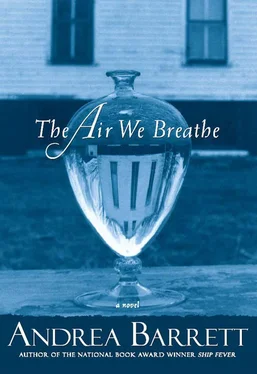“Why didn’t you bring warmer clothes?”
“I packed exactly what the tuberculosis nurse in Brooklyn told me to,” Leo said.
She shook her head and made a note on her clipboard. “We keep telling them — these are completely insufficient. Put on those pajamas for now.” While he dressed she bundled up his belongings. “No books, you won’t be reading for quite a while. We’ll issue you appropriate clothes from the storeroom. The other things we’ll fumigate and put away. I need the address of your next of kin, so we know who to contact if that becomes necessary.” She stood with her pencil poised.
“I have no family in this country,” he finally said. “Why else would I be here?”
“If you don’t appreciate how lucky you are to be given this chance to cure,” she said, “and to be supported by the state while your health improves, there are plenty who’d be glad to change places with you.” How many times have we heard that? “You have no family?”
“None,” he said.
She shook her head. “Another one. Where do you all come from?”
If he’d had a place to go, he might have walked away. “I’m grateful to be here,” he said instead. He was twenty-six years old, and the nurse had just touched everything he owned. On a machinist’s hand he could count the friends — Vincenzo, from the sugar refinery; Meyer, from the boat — who knew or cared where he was.
She stowed him in an empty ward, the top sheets of the beds around him pulled so taut that the edges hovered above the blankets. All of us, he later learned, started out here, wedged between those cotton sheets in one of the white enameled beds, each separated from its neighbor by a small white cupboard. He learned to eat, propped up very slightly, from a white tray on a wheeled stand that swung over his chest. He learned to use a bedpan, to brush his teeth and wash his face in bed, to cough always into a paper handkerchief and expectorate into a waxed-paper sputum cup, casting cups and handkerchiefs into a paper bag pinned to his stand. He learned that his meals, which came on trays, would almost always be cold but would be garnished by a bit of folded colored paper, a Daily Thought: Resting is done with the mind as well as the body. Getting well depends on YOU.
On Thursday, his weekly bath day, he squinted with fear when an orderly came, heaved him from his bed onto a stretcher, and rolled the stretcher into the bathroom, but the tub was now off-limits to him; instead he was sponged gingerly and then patted dry, covered with blankets, and inserted back into bed. Food came endlessly, more than he’d seen since childhood. The nurse followed the food cart, taking his temperature and his pulse, and the minute she left—“Coughing can be controlled, ” she scolded — he hacked and heaved and rattled in ways that he couldn’t, before, have imagined. In the early evening a resident doctor made rounds, peering briefly at him and then making notes on his chart. If all went well, the doctor said, and he rested thoroughly and ate everything, he might be allowed in a few weeks to walk once a day to the bathroom, to sit in a chair for fifteen minutes, to read or write for another fifteen.
DURING HIS CONFINEMENT to the infirmary, weeks spent staring out the window while time clotted like blood in a bowl, Leo thought often about the Lithuanian forest of his earliest summers, dark and leafy and crowded with men who cut down trees and lashed them into rafts they sent hurtling down the river. Because he’d been a Russian citizen, people he met in this country usually thought he was Russian. But in fact his father’s people were Baltic Germans and his mother’s were Polish, and divided; her parents were converts. When he was small, and his mother was still alive, he’d lived near her parents, in Grodno. Every summer, though, he’d spent six weeks in a forest called Bial łowiez? a, near the rest of his mother’s family, who were Jews. In Grodno he learned to speak as his mother did: Polish to her parents and her parents’ friends; Russian to his father, who worked for the government, and his father’s friends. His mother’s other language, which she spoke in the forest, he lost when she died.
The forest, which he lost as well, remained in his dreams. When his father sold the house and started moving them from village to town to marshy plain, always south until they finally settled in the outskirts of Odessa, Leo retreated in his sleep to the woods where his cousins had taught him to use an ax. His father married a plump Ukrainian with bright yellow hair and narrow eyes, and then he had brothers and sisters who looked like buttercups. He shot up, gangly and dark, amazed at the black hairs sprouting from his knuckles. The year he was thirteen, soldiers murdered Jews in nearby Kishinev and his father stormed around the house until the new wife seized Leo by the shoulders, thrust him in front of his father, and said, “This one makes you feel like that. The son of that Yid.”
“She was Catholic,” his father said. “My wife.”
“Pfff,” the new wife said. “Once a Jew…”
So he was Jewish, then? Yes to his stepmother, no to his father, yes in Odessa, no in New York. His father hadn’t defended him, and everything that happened in the years just after Kishinev, after he’d run away from home, was jumbled. In Odessa, a stray boy knowing several languages hadn’t been unusual; the city was filled with strangers born in Italy and Germany and Turkey and Sweden, all busily trading and making money. He’d found work in a cooperage run by a Greek; later with a French wine merchant who offered him room and board. He was clever, the merchant said approvingly. And had clever hands. With the merchant’s help, he studied chemistry at the polytechnic institute, learning along the way about fermentation and the making of wine. For a while he worked at a winery, but later, as the strikes and the riots continued and his friends fled one by one, the balance had tipped for him as well. At twenty he felt like a middle-aged man; what was there to keep him at home? His mother was dead and his father was dead to him. He left for America convinced that here, he might be anyone.
Instead, somewhere between his first days on the Lower East Side and his move to Williamsburg and the sugar refinery, between the job in the char house, which he’d hated, and the one he’d made for himself, as the head chemist’s assistant, his lungs had rotted and all his prospects had disappeared. Working one day at the refinery, he’d walked from the room upstairs, where he’d been testing effluent from the melter, down four flights and past the hall that led to the char house, across the floor where the graders were working, and into the corner laboratory next to the dock, where the head chemist was analyzing a sample from the ship. He’d given Karl his results, said good night, and stepped outside. Near the door was a bin of raw sugar, the last load left to be tested. He’d leaned over to look at the color and rubbed a pinch between his fingers. Then he’d coughed — the same cough he’d had all spring, no more — and watched, astonished, as blood sprayed over the pale crystals.
Everything after that had also caught him by surprise, and that itself had been surprising. Despite his six years in New York, despite all his jobs and the people he’d met and the evening classes leading up to his citizenship hearing, he still hadn’t expected the way that, once the government was involved, one step led to the next and the next, until he was cornered and forced up here. A nurse came to the flat where he’d boarded in Brooklyn. Someone who had seen what happened at the refinery had told someone else, who’d told someone who worked at the clinic. What a fool he’d been, not to spit over the side of the dock, not to hide his cough! A mouthful of blood on a mountain of sugar, and then this.
Читать дальше












